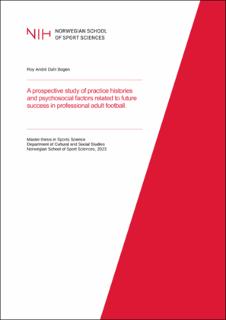| dc.description.abstract | The understanding of talent identification and development in football has increasingly emphasized the importance of environmental influences and applied interventions in predicting the potential of youth players. Psychosocial factors have been acknowledged as influential in talent development, while the optimal amount and type of training for children and adolescents to excel in football remains a subject of frequent discussion. This study aimed to prospectively explore the practice histories and psychosocial factors associated with future success in professional adult football in Norway. Utilizing data from a national survey conducted twelve years prior, involving participants from all Norwegian Premier League club academies, the study assessed the participants' career success twelve years after initial testing. Categorizing the participants as elite or non-elite based on the definition of professional football in Norway, the study revealed that players born in the first two quartiles of the year and perceiving their fathers as significant figures in their careers were more prevalent among all participants. Compared to non-elite players, elite players were initially older, had better contracts, participated more frequently in the last national talent camp, and had higher goals for their level of play. While practice histories showed minimal differences, elite players reported greater weekly hours of organized practice. All participants engaged in substantial football-specific practice. Furthermore, elite players demonstrated higher levels of certainty in achieving their goals, doing everything to reach them, scoring higher on self-regulation, exhibiting potentially higher degrees of resilience, and potentially more often benefiting from a supportive and self-regulating environment within their club. The study's findings indicate that players who reach professional adult football in Norway set higher goals, may possess greater self-belief, and possibly employ more effective strategies for development and learning. This study supports the importance of psychosocial factors and emphasizes the long-term developmental nature of talent development in football. | en_US |
